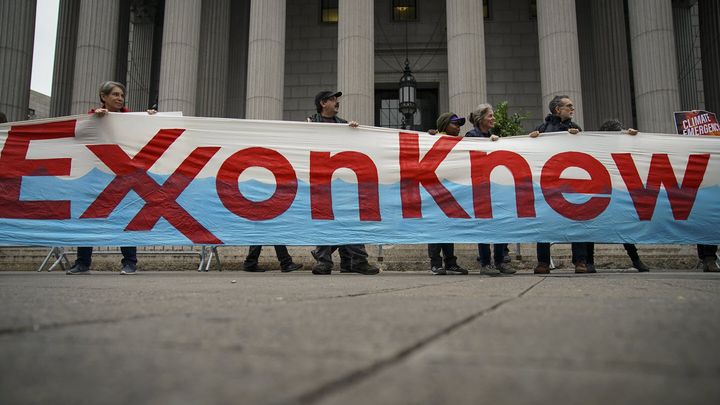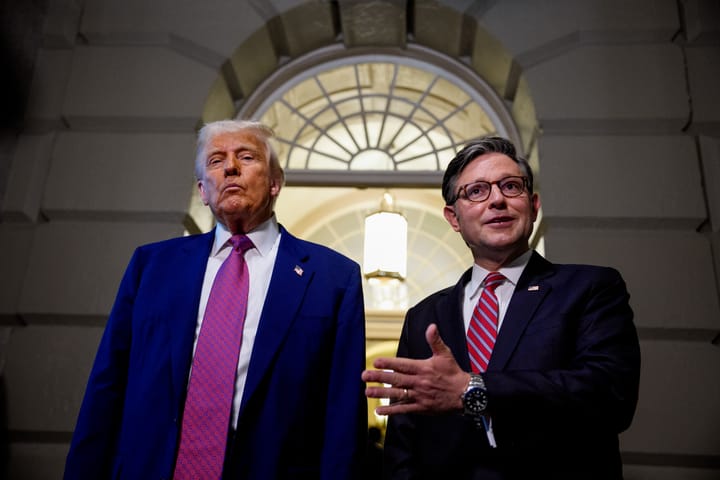This article by Gin Armstrong and Derek Seidman was first published at Eyes on the Ties, a news site by LittleSis.org
There’s no doubt about it: Paul, Weiss, Rifkind, Wharton & Garrison LLP is one of the most prestigious law firms in the U.S. Its attorneys rake in millions representing some of the most powerful corporate actors in the world. Its leaders serve as donation bundlers for major presidential candidates and Trustees for some of the nation’s most prominent universities. Last year, The American Lawyer named Paul Weiss “Law Firm of the Year” and “White Collar Litigation Department of the Year.” The firm’s New York City headquarters are just a skip away from Rockefeller Center and the Museum of Modern Art.
Coming out of law school, you’d think that snagging a cushy job at Paul Weiss would be every law student’s dream. But a growing number of law students are pledging to refuse to work for Paul Weiss – or even to interview with the firm – until it drops ExxonMobil as a legal client.
The campaign is called #DropExxon. It announced itself last month when Harvard Law students disrupted a Paul Weiss recruitment event at an upscale Cambridge, Massachusetts restaurant. Paul Weiss attorney Ted Wells is Exxon’s lead attorney and also a Harvard Corporation Trustee.
The next disruption was three weeks later at Yale, and, days later, at New York University. This week, University of Michigan law students joined the protests. Barely a month old, the campaign is set to spread to other campuses.
Paul Weiss has served as lead counsel for ExxonMobil for years, representing the Big Oil giant against a host of climate lawsuits. Most recently, the firm successfully defended Exxon against a $1.6 billion lawsuit, brought by the State of New York, alleging that the company mislead investors over the risks of climate change. It was only the second climate change lawsuit to ever reach trial in the U.S.
Overall, Paul Weiss has defended Exxon in at least a dozen climate liability cases brought about by states and municipalities. The firm’s legal tactics on Exxon’s behalf have been labeled everything from “blatantly obstructionist” to “disingenuous” by different state attorneys general.
Exxon is the biggest oil company in the U.S. It raked in $20.8 billion in profits in 2018. As the world faces a growing climate emergency, Exxon recently announced its intent to ramp up oil production by 80% in the world’s busiest oil field to 1 million barrels per day. This comes as a startling new report just revealed that the level of methane emissions released by fossil fuel companies is likely much worse than we previously thought.
In 2015, a wide-ranging series of investigations uncovered that, for decades, Exxon had conducted internal research on global warming and knew about the dire impact of its fossil fuel production in driving our growing climate crisis. All this was happening at the same time Exxon was funding climate denialism and working to crush attempts to regulate carbon emissions.
Now the public is aiming to hold Exxon accountable for this deception – and Paul Weiss is trying to defend Exxon from this.
Big firms like Paul Weiss face tight competition to recruit talent from top law schools. Organizers with #DropExxon see where they have leverage – Paul Weiss does not want to become the poster child for Big Law’s complicity with our climate crisis, a stigma stuck to its name among thousands of rising law students nationwide.
The campaign isn’t saying that corporations that destroy our planet should be denied lawyers – but rather, that young attorneys who care about justice have other options than to go work for these firms.
Moreover, when it comes to Paul Weiss, ExxonMobil is just one of the worst of its many questionable clients. From Big Tobacco to opioid crisis profiteering, Paul Weiss has made millions from defending some of the most repugnant corporate villains of recent decades:
- Vouching for opioid crisis profiteers. Paul Weiss partner David M. Bernick is a lead attorney for Richard Sackler, the billionaire former president and chairman of Purdue Pharma, and other members of the Sackler family. The Sacklers have faced billions in lawsuits over their role in creating the nation’s opioid crisis that has killed hundreds of thousands. Richard Sackler was a leader of the company as it pushed doctors to prescribe OxyContin, while he blamed victims for their own addiction. Bernick has been a go-to defender of the Sacklers, even appearing on Good Morning Americato represent them. After it was revealed that Richard Sackler called opioid users “victimizers” responsible for their own fate, Bernick defended Sackler by saying he used insensitive language that didn’t “reflect what he actually did about the emerging problem of opioid abuse.”
- Defending Big Tobacco. Paul Weiss represented Philip Morris in U.S. v. Philip Morris, the case in which Philip Morris was finally held liable for systematically concealing the health risks of smoking and marketing tobacco to children for decades. Notably, Ted Wells, who defended Phillip Morris, used an argument in court that was similar to Paul Weiss’ defense of Exxon – that Philip Morris now acknowledges the science proving the dangerousness of cigarettes and tobacco. This is very similar to Paul Weiss and Exxon’s position in The People of the State of NY v. Exxon Mobil, that “there is a serious problem relating to climate change, and we acknowledge that that problem is real and must be addressed.”
- Defending Wall Street’s most egregious crooks. Several Paul Weiss partners, including Ted Wells, represented notorious hedge fund trader Steven Cohen and his firm SAC Capital – a firm that was once described as a “magnet for market cheaters” – in an insider trader case brought by the SEC. Cohen is a well-connected figure on Wall Street, major art collector, and minority owner of the New York Mets. SAC pled guilty to fraud and paid $1.8 billion in fines. While Cohen managed to evade criminal charges with the help of Paul Weiss, other high ranking SAC traders were convicted, including portfolio manager Mathew Martoma, who was sentenced to nine years in jail. As part of the settlement, Cohen was barred from managing outside money for two years. He’s since restructured SAC into Point72 Asset Management LP.
- Protecting the NFL against its concussed players. Paul Weiss represented the National Football League in lawsuits brought against it by over 4,800 former players when it was revealed that the league systematically concealed and downplayed the extent of the dangers they faced from concussions they suffered as football players. In her defense of the NFL, Paul Weiss attorney Beth Wilkinson said, “Let’s be clear. Let’s be clear. We strong— we strongly deny those allegations that we withheld any information or misled the players.” Ultimately the NFL ended up settling with players for $1 billion, half of what players were seeking, leading many to appeal.
- Big bank subprime lenders. A team of Paul Weiss lawyers helped Citigroup, a bank widely seen as a major actor in the housing foreclosure crisis, evade a lawsuit brought by investors who purchased collateralized debt obligations (CDOs) that were backed by subprime mortgages. The investors filing the lawsuit said that Citigroup misrepresented the CDOs, but Paul Weiss managed to cast doubt on whether Citigroup knew about the volatile structure of the CDOs they sold. Ultimately, however, Citigroup was forced to pay a fine of $7 billion for knowingly selling financial instruments tied to faulty mortgages.
- Private equity raider who associated with Jeffrey Epstein. Paul Weiss lawyers have advised Apollo Global Management, the world’s 9th biggest private equity firm, on mergers and acquisitions with various companies, including ADT Corporation and Shutterfly. As is common with private equity firms, Apollo has been instrumental in bankrupting several of its takeovers, including Noranda Aluminum, Caesars, and Claire’s, which resulted in hundreds of job losses. Apollo was also a major bondholder of Puerto Rico’s debt. Apollo’s founder Leon Black has come under scrutiny in recent months because of his close business relationship to convicted sex trafficker Jeffrey Epstein. While Black has tried to play down his ties to Epstein, Black admitted that Epstein advised him on various tax and philanthropic strategies and advised other Apollo partners under Black’s direction. Epstein served as a director of Black’s family foundation for years after he was convicted for soliciting prostitution from a minor in Florida, though Black claims this was due to a “paperwork error.”
The list could go on.
Paul Weiss does not have to defend rogue corporate actors – it chooses to do so. Law firms have taken moral stands in the past against toxic clients. For example, in 1985, Covington & Burling, the largest law firm in Washington, D.C., dropped South African Airways after the firm faced boycotts from law students from Harvard, Yale, NYU, and other schools, who opposed the firm’s complicity with South African apartheid. More recently, attorneys at Davis Polk were allowed to decline representing Big Tobacco clients if they had moral or ethical objections.
Law students have options that don’t involve representing climate crisis profiteers. As the nation’s top legal talent graduate into a world of intensifying climate emergency, the pressure is mounting on firms like Paul Weiss to make a break with Big Oil.


